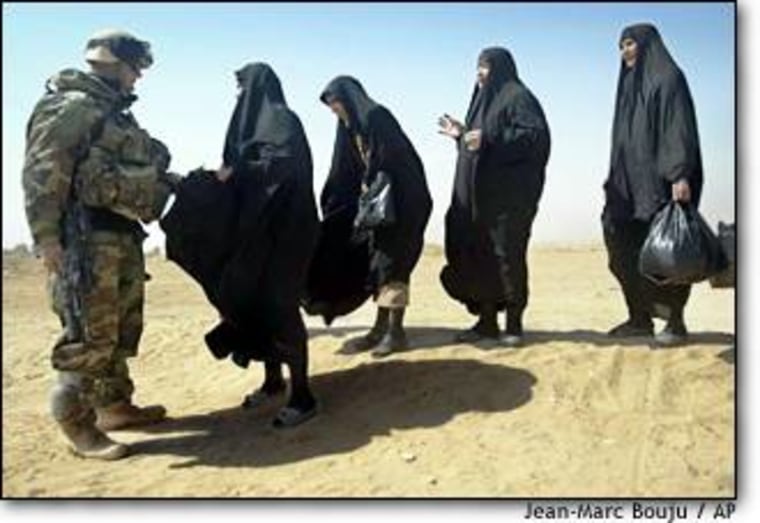As units of the 101st Airborne moved into Najaf Tuesday, Iraqi civilians came forward on at least two occasions to point out minefields in their path. American commanders say that could be an indication that U.S. forces are beginning to win the trust of some Iraqis, a key goal of the U.S. and its allies in their fight to topple the government of Saddam Hussein.
A plume of smoke was rising from the center of the city as we began advancing Wednesday morning in the northern suburbs with elements of the 2nd Brigade of the 101st Airborne. Hundreds of soldiers were moving forward, accompanied by others riding on armored personnel carriers from the 270th Armored , while the 1st of the 101st attacked from the south.
Some of the local residents came out of their homes and approached the U.S. forces, who searched them to make certain they were not armed and then let them go.
But one man began talking to us in Arabic and gesturing toward a nearby field. At first, we thought he used the field for growing crops and was worried that our heavy vehicles would damage them. But then we understood he was saying the field had been mined.
(The Washington Post reported a similar incident in the south of Najaf on Tuesday, where an elderly Iraqi man warned members of the 1st Brigade of a minefield in their path.)
Two of the tanks had already crossed the field and soldiers radioed to them to stop. We followed, moving carefully in the tracks of the tank treads. The gunners on the tanks saw more mines in the road ahead and began firing at the ground with their machine guns, blowing up at least four mines. When a mine exploded, the force could be felt 200 feet away.
About 10 minutes after we’d crossed the field, a U.S. Humvee behind us struck a mine and was severely damaged, with the right-hand seat destroyed. Fortunately, the driver was on the left-hand side and another soldier was on top, and neither was injured.
NO LOVE FOR SADDAM
A U.S. commander said the warning about the minefield was encouraging because Najaf is a city that U.S. officials had hoped might welcome U.S. assistance in getting rid of Saddam Hussein. As the site of the Tomb of Ali, the son-in-law of the prophet Mohammed, Najaf is one of the holiest places in the world for Shiite Muslims, who constitute a majority of Iraq’s population. In the aftermath of the 1991 Gulf War, Najaf was among the first Iraqi cities to rebel, but the insurrection was brutally suppressed by Saddam, whose government is dominated by rival Sunni Muslims. Many believe America’s failure to prevent that 1991 rebellion from being crushed partly explains why no mass uprising has occurred in this war.
As U.S. forces entered the northern edge of the city Wednesday, there was some gunfire, but most of the Iraqi irregular forces who had been defending the city seemed to have disappeared. They are seen as a threat, with mortars and AK-47 automatic weapons, but they appear to have no tanks or artillery.
The U.S. commanders took no chances, arraying heavy artillery on the city’s outskirts and sending Apache attack helicopters buzzing overhead. For the most part, the artillery fired smoke shells to provide concealment as the U.S. troops advanced.
The armored vehicles went in ahead of the infantry, to probe the narrow streets and draw enemy fire, forcing the Iraqis to reveal their positions. The sound of machine gun fire was heard occasionally, but many streets were deserted.
NOT A FAIR FIGHT
On some streets, however, civilians crossed in front of U.S. tanks, raising fears of possible guerilla attacks by troops wearing civilian clothing. The American forces are on edge because of what they see as unethical conduct by the Iraqis.
There were reports Tuesday morning that the Iraqis were making mines in a building at the local university and that other irregular troops had grabbed a group of young men and used them as human shields.
The most worrisome report, from U.S. central Command, was that some Iraqi forces were hiding inside the Tomb of Ali, which is in downtown Najaf, and firing at their attackers. American commanders know that any damage to the mosque could enrage the Shiite population, so they want to avoid attacking the building. But at the same time they are obligated to return fire if it’s endangering their position.
By Tuesday evening, much of the city was in the hands of the 101st Airborne. People came out of their houses smiling, trying in broken English to express how much they hate Saddam Hussein and how happy they are to see the American soldiers.
That may be a big boost for the morale of the U.S. troops here. They haven’t felt good wiping out Iraqi soldiers who are running at them with AK-47s in pickup trucks and taxicabs. While they may have rocket-propelled grenades, they’re basically committing suicide when they go against an M1A1 Abrams tank.
Members of one tank unit yesterday said there were no “high fives,” and no great feelings of victory after one such encounter. They took on the enemy, they beat them, they did what they had to do. Now, they said, let’s move on and get this done.
(Dana Lewis is an NBC News correspondent traveling with the 101st Airborne Division in Iraq.)
